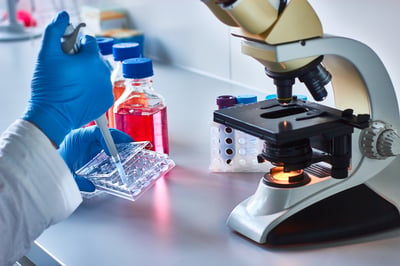All XRAYs



Relevance: Medium-Low
Most relevant for: People who have a Variant of Uncertain Significance in a gene associated with cancer risk.
Study: A new method for determining whether genetic variants in BRCA1 increase cancer risk
Ever since BRCA1 was discovered, researchers have been trying to understand which of the thousands of possible DNA changes in this gene increase cancer risk and which are harmless changes. A new study in Nature reports how a cutting-edge technology called “genome editing” may be used to classify changes—known as variants of uncertain significance-in BRCA1 as harmful or harmless. Once validated, this same technology may be used to classify variants in other genes. (9/29/18)
READ MORE ›


Relevance: Medium-High
Most relevant for: Women with an inherited mutation linked to increased risk for cancer
Article: Cancer experience in families affects decision making
Women with inherited mutations in genes that increase breast and ovarian cancer risk have an additional challenge: coping with how those mutations impact their families and how a family member’s cancer experience can shape their own perception. In a recent U.S. News and World Report article, Elaine Howley explores how a woman's decisions about healthcare, cancer prevention and treatment are affected by experience with cancer in the family. (9/25/18)
READ MORE ›


Relevance: Medium-High
Most relevant for: Women with BRCA1 mutations who have had risk-reducing ovary removal and have never been diagnosed with breast cancer
Study: Hormone therapy and breast cancer risk after ovary removal in women with a BRCA1 mutation
Does hormone therapy (HT) alter the risk of breast cancer for woman carrying a BRCA1 mutation who have never been diagnosed with cancer? In this study, researchers showed that among women with BRCA1 mutations, HT use did not increase breast cancer rates for 10 years after ovary removal. More women taking combined estrogen plus progesterone developed breast cancer compared to those taking estrogen only, though this difference was not statistically significant. (9/7/18)



Relevance: Medium-High
Most relevant for: People diagnosed with breast cancer who would benefit from increased activity and from eating more vegetables
Study: Gardening improves health outcomes for breast cancer patients
Research has shown that adopting a healthier lifestyle may improve overall health and outcomes for cancer survivors. This study looked at a 1-year home-based gardening intervention to increase activity and wellbeing among breast cancer survivors. (08/31/18)
READ MORE ›


Relevance: Medium-High
Most relevant for: People diagnosed with triple-negative breast cancer
Study: Study identifies genes associated with risk of triple-negative breast cancer
Panel testing can identify women who are at increased risk for breast cancer. However, those at risk for triple-negative breast cancer cannot easily be identified because other than BRCA1, genes that increase the risk for triple-negative breast cancer are unknown. A new study uses panel testing to identify which genes increase the risk for triple-negative breast cancer. (8/23/18)
READ MORE ›


Relevance: High
Most relevant for: People diagnosed with early stage breast cancer
Study: Declining use of chemotherapy for early-stage breast cancer: examining oncologist recommendations
A new study shows that chemotherapy use for early-stage, node-positive and node-negative breast cancers declined from 2013 to 2015. It also reports that oncologists’ recommendations are influenced to differing degrees by patient preferences and tumor test results, despite unchanging health care guidelines. (8/21/18)
READ MORE ›


Relevance: Medium-High
Most relevant for: People with advanced cancers
Study: Immunotherapy may lead to long-term remission of metastatic breast cancer
Metastatic breast cancer is often difficult to treat. In a new approach, called adoptive cell therapy (ACT), a patient’s own T-cells (a type of cancer-fighting immune cells) are collected, multiplied in a lab, and then returned to the patient. The goal is to enhance the patient’s immune system with many more T-cells that recognize and attack metastasized tumor cells. This study reports on a single patient whose metastatic breast cancer is still in remission (no evidence of disease) after more than 22 months following ACT. (8/16/18)
READ MORE ›


Relevance: Medium
Most relevant for:
Article: Interview with Angelina Jolie's doctor promotes meatless diet and scientific inaccuracies
Dr. Kristi Funk, Angelina Jolie's Hollywood breast surgeon, is promoting her new book about breast cancer. This article from the UK newspaper The Times includes an interview with Funk about her book, which proposes that diet is responsible for breast cancer. This XRAYS addresses scientific inaccuracies in this article. (8/7/18)
READ MORE ›


Relevance: Medium-High
Most relevant for: People with node-negative, ER-positive breast cancer
Study: Some women with early-stage breast cancer forego chemotherapy
A research study named the “Trial Assigning Individualized Options for Treatment” (TAILORx) asked whether chemotherapy is beneficial for women who have mid-range Oncotype DX tumor recurrence scores. This trial — the largest breast cancer treatment trial ever conducted— showed that endocrine therapy alone was as effective as endocrine therapy plus chemotherapy in women with certain types of early-stage breast cancer. The results of this trial are expected to be immediately practice changing (7/20/18)
READ MORE ›


Relevance: High
Most relevant for: People diagnosed with breast cancer
Article: High health insurance deductibles can interfere with breast cancer treatment decisions
A New York Times article published on May 4, 2018 examines the impact of high insurance deductibles on breast cancer treatment. (7/12/18)
READ MORE ›